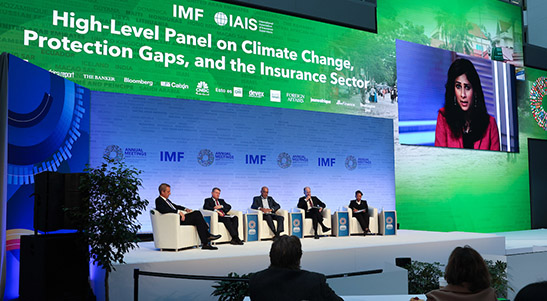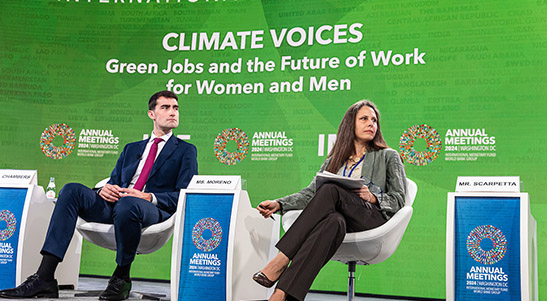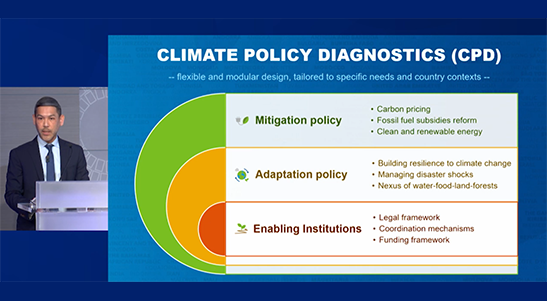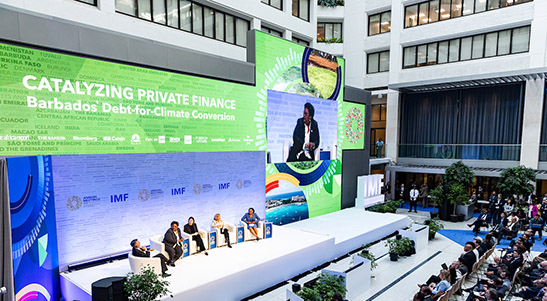
Climate change presents a major threat to long-term growth and prosperity, and has a direct impact on the economic wellbeing of all countries. The IMF has an important role to play in helping its members institute fiscal and macroeconomic policies to help address these climate-related challenges. We are mainstreaming climate-related risks and opportunities into our macroeconomic and financial policy advice. Climate considerations are now embedded in our bilateral and multilateral surveillance, capacity development, and lending. We also increasingly collaborate with other organizations on climate issues.
Through our analytical work we have examined policy issues such as an international carbon price floor, the transition to a green economy, border carbon adjustments, scaling up private climate finance in emerging market and developing economies, strengthening climate information architecture, fiscal policies to support adaptation, and green public investment and public financial management.
Delivering on global climate goals requires a shift to renewable energy and other green technologies. The main challenge for developing economies is securing funding for this transition. With limited fiscal space and low financial development, foreign direct investment (FDI) and official lending are crucial. This high-level panel discussed market reforms and financial sector policies to attract official financing, the impact of climate policies on FDI in low-carbon technologies, and the conditions needed to attract it.

Closing the gender gap in science, technology, engineering, and math would accelerate the green transition while making it more inclusive

Easing the burden on lower-income households is not only socially fair, but also economically efficient

New books offer fresh perspectives on climate, China, and John Maynard Keynes

Data Gaps Initiative helps policymakers better understand the environmental impact of economic activities and the effectiveness of climate policies

Our biggest challenges—from global warming to demographic and technological transformations—cannot be resolved by countries acting alone.

Meeting the continent’s emission reduction targets could enhance energy security metrics by 8 percent by 2030—and that would be just the start
Mitigation and decarbonization efforts are falling short of the 1.5°C goal, making adaptation critical. Developing economies are affected the most, despite having contributed the least to the problem. Nearly 98 percent of adaptation finance comes from public actors, with highly fragmented flows from the private sector. As financing needs increase, bringing private sector finance becomes critical and requires reframing adaptation investments from being seen not just as a risk exposure but also as an investment opportunity. This requires addressing real and perceived investment barriers, public-private collaboration and risk sharing, as well as financial incentives and innovation to unlock scalable, inclusive solutions. Adaptation is more complex than mitigation, with challenges in defining, evaluating, pricing, and scaling investments. Progress on adaptation requires policy reforms, incentives, and partnerships between governments, businesses, and communities and public-private risk sharing.
A technical assistance (TA) mission was undertaken with the Statistics South Africa in Pretoria, between June 10–14, 2024. The objective of the mission was to support Statistics South Africa and other relevant official agencies in the compilation of energy and air emissions accounts. The tasks completed included the review of the scope and coverage of existing data sources and accounts, the identification of the new sets of information to be collected, and the review of the available methodological options for the compilation of the updated energy and air emissions accounts. An action plan for the compilation and release of the specified accounts and indicators was developed and agreed with the authorities.
A technical assistance (TA) mission was undertaken with the Departamento Administrativo Nacional de Estadística (DANE), Colombia between May 20-24, 2024. The objective of the mission was to support DANE in the compilation of updated energy and air emissions accounts, mineral and energy monetary asset accounts, and domestic carbon footprints. The tasks completed included the review of the scope and coverage of existing data sources and accounts, the identification of the new sets of information to be collected, and the review of the available methodological options for the compilation of the updated energy and air emissions accounts, mineral and energy monetary asset accounts, and domestic carbon footprints. An action plan for the compilation and release of the specified accounts and indicators was developed and agreed with the authorities.
Colombia is deeply committed to climate change policies, as evidenced by Law N° 1931 (2018), which outlines actions to adapt to climate change and reduce greenhouse gas emissions, aiming to decrease the vulnerability of the population and ecosystems while promoting a sustainable, low-carbon economy. The National Statistical office of the country, Departamento Administrativo Nacional de Estadística (DANE), is dedicated to developing integrated environmental and economic data, and regularly compiles and disseminates selected accounts from the System of Environmental-Economic Accounting (SEEA). However, to effectively implement climate change mitigation and adaptation strategies, Colombia requires substantial amounts of granular, relevant, and reliable data for evidence-based planning. In this context, a mission took place from July 17-21, 2023, funded by the Swiss State Secretariat for Economic Affairs (SECO) and hosted by DANE. During this mission, discussions with authorities focused on key priorities, identifying feasible developments such as enhancements to existing SEEA energy and emissions flow accounts, mineral and energy asset accounts, and the establishment of domestic carbon footprints.
This report summarizes findings from a Public Investment Management Assessment (PIMA) and the Climate Module (C-PIMA) conducted for Tajikistan. The assessment evaluated the country's public investment management practices, including their climate sensitivity. Tajikistan performs well in certain areas but faces significant gaps in others. Parallel external and internally financed processes present recurring challenges across Tajikistan’s public investment management framework, limiting consistency and strategic alignment. Implementing a comprehensive framework for overseeing all projects, regardless of funding source, would significantly improve efficiency and climate responsiveness.
Kenya is confronted with the need to chart a course that attends directly to the recent public outcry. The widespread protests that started in June and resulted in tragic loss of lives and injuries were triggered by the authorities’ efforts to correct a large tax revenue shortfall in FY2023/24 through revenue raising proposals in the 2024 Finance Bill, some of which were unpopular or seen as regressive. The protests forced the President to withdraw the Bill, introduce significant spending cuts through a Supplementary Budget in July, and reconstitute the Cabinet in August. Persistent difficulties in mobilizing revenue coupled with spending rigidities have led to a further accumulation of pending bills, and necessitated deep cuts in development spending, with potential for knock-on effects on growth and debt sustainability. Against this backdrop, preceded by large exogenous shocks (COVID-19, global developments impacting import price and affordable access to market finance, and severe multi-season droughts), the authorities face a complex and difficult balancing act: meeting critical spending needs for priority areas (social programs, health, and education), servicing large upcoming debt obligations, and boosting domestic revenues. Earlier in the year, Kenya addressed the exceptional balance of payments (BoP) needs associated with repayment of the June 2024 US$2 billion Eurobond, boosting market confidence that helped strengthen the shilling and build reserves. Meanwhile, fiscal pressures continue, including from uncertainty surrounding the constitutionality of the 2023 Finance Act on which the Supreme Court’s decision is awaited.
Mitigation and decarbonization efforts are falling short of the 1.5°C goal, making adaptation critical. Developing economies are affected the most, despite having contributed the least to the problem. Nearly 98 percent of adaptation finance comes from public actors, with highly fragmented flows from the private sector. As financing needs increase, bringing private sector finance becomes critical and requires reframing adaptation investments from being seen not just as a risk exposure but also as an investment opportunity. This requires addressing real and perceived investment barriers, public-private collaboration and risk sharing, as well as financial incentives and innovation to unlock scalable, inclusive solutions. Adaptation is more complex than mitigation, with challenges in defining, evaluating, pricing, and scaling investments. Progress on adaptation requires policy reforms, incentives, and partnerships between governments, businesses, and communities and public-private risk sharing.
A technical assistance (TA) mission was undertaken with the Statistics South Africa in Pretoria, between June 10–14, 2024. The objective of the mission was to support Statistics South Africa and other relevant official agencies in the compilation of energy and air emissions accounts. The tasks completed included the review of the scope and coverage of existing data sources and accounts, the identification of the new sets of information to be collected, and the review of the available methodological options for the compilation of the updated energy and air emissions accounts. An action plan for the compilation and release of the specified accounts and indicators was developed and agreed with the authorities.
A technical assistance (TA) mission was undertaken with the Departamento Administrativo Nacional de Estadística (DANE), Colombia between May 20-24, 2024. The objective of the mission was to support DANE in the compilation of updated energy and air emissions accounts, mineral and energy monetary asset accounts, and domestic carbon footprints. The tasks completed included the review of the scope and coverage of existing data sources and accounts, the identification of the new sets of information to be collected, and the review of the available methodological options for the compilation of the updated energy and air emissions accounts, mineral and energy monetary asset accounts, and domestic carbon footprints. An action plan for the compilation and release of the specified accounts and indicators was developed and agreed with the authorities.
Colombia is deeply committed to climate change policies, as evidenced by Law N° 1931 (2018), which outlines actions to adapt to climate change and reduce greenhouse gas emissions, aiming to decrease the vulnerability of the population and ecosystems while promoting a sustainable, low-carbon economy. The National Statistical office of the country, Departamento Administrativo Nacional de Estadística (DANE), is dedicated to developing integrated environmental and economic data, and regularly compiles and disseminates selected accounts from the System of Environmental-Economic Accounting (SEEA). However, to effectively implement climate change mitigation and adaptation strategies, Colombia requires substantial amounts of granular, relevant, and reliable data for evidence-based planning. In this context, a mission took place from July 17-21, 2023, funded by the Swiss State Secretariat for Economic Affairs (SECO) and hosted by DANE. During this mission, discussions with authorities focused on key priorities, identifying feasible developments such as enhancements to existing SEEA energy and emissions flow accounts, mineral and energy asset accounts, and the establishment of domestic carbon footprints.
This report summarizes findings from a Public Investment Management Assessment (PIMA) and the Climate Module (C-PIMA) conducted for Tajikistan. The assessment evaluated the country's public investment management practices, including their climate sensitivity. Tajikistan performs well in certain areas but faces significant gaps in others. Parallel external and internally financed processes present recurring challenges across Tajikistan’s public investment management framework, limiting consistency and strategic alignment. Implementing a comprehensive framework for overseeing all projects, regardless of funding source, would significantly improve efficiency and climate responsiveness.
Kenya is confronted with the need to chart a course that attends directly to the recent public outcry. The widespread protests that started in June and resulted in tragic loss of lives and injuries were triggered by the authorities’ efforts to correct a large tax revenue shortfall in FY2023/24 through revenue raising proposals in the 2024 Finance Bill, some of which were unpopular or seen as regressive. The protests forced the President to withdraw the Bill, introduce significant spending cuts through a Supplementary Budget in July, and reconstitute the Cabinet in August. Persistent difficulties in mobilizing revenue coupled with spending rigidities have led to a further accumulation of pending bills, and necessitated deep cuts in development spending, with potential for knock-on effects on growth and debt sustainability. Against this backdrop, preceded by large exogenous shocks (COVID-19, global developments impacting import price and affordable access to market finance, and severe multi-season droughts), the authorities face a complex and difficult balancing act: meeting critical spending needs for priority areas (social programs, health, and education), servicing large upcoming debt obligations, and boosting domestic revenues. Earlier in the year, Kenya addressed the exceptional balance of payments (BoP) needs associated with repayment of the June 2024 US$2 billion Eurobond, boosting market confidence that helped strengthen the shilling and build reserves. Meanwhile, fiscal pressures continue, including from uncertainty surrounding the constitutionality of the 2023 Finance Act on which the Supreme Court’s decision is awaited.

Article IV consultations will cover macro-critical issues triggered by climate change and/or the need to contain it. These include countries’ contributions to the global mitigation effort, especially by large emitters; domestic policy challenges that arise in the context of achieving countries’ nationally determined contributions under the Paris Agreement; macroeconomic policies to adapt to and build resilience to climate change; and challenges presented by a global transition to low-carbon energy.
Financial Stability Assessment Program (FSAP)
FSAPs are paying increasing attention to climate risk analysis for the financial system. Recent FSAPs have looked at the implications of transition risk in Norway, South Africa, Chile, Colombia and the UK, and physical risk in the Philippines. Where relevant, climate risk considerations are also being embedded in FSAP reviews of financial supervision and regulation.

The IMF already supports member countries through capacity development in countries vulnerable to climate change and natural disasters.

Adaptation
Guidance on building financial and institutional resilience to natural disasters and extreme weather events, and infrastructure investments to cope with rising sea levels and other warming-related phenomena.
Mitigation
Advice on measures to contain and reduce emissions through policies—such as increasing carbon taxes, reducing fuel subsidies and improving regulation—and providing tools to help countries achieve their Nationally Determined Contributions.
Transition to a low-carbon economy
Advice on measures to contain and reduce emissions through policies—such as increasing carbon taxes, reducing fuel subsidies and improving regulation—and providing tools to help countries achieve their Nationally Determined Contributions.
Data
The IMF's Climate Change Indicators Dashboard provides a platform for disseminating climate change data for macroeconomic and financial stability analysis. The dashboard helps users assess the linkage between economic and financial activities and government policies on the one hand, and climate change (and environment more broadly) on the other—either on a country-level or cross-country basis—by analyzing a standardized set of comparable data.

The IMF’s Resilience and Sustainability Trust (RST) helps low-income and vulnerable middle-income countries build resilience to external shocks and ensure sustainable growth, contributing to their longer-term balance of payments stability. It complements the IMF’s existing lending toolkit by providing longer-term, affordable financing to address longer-term challenges, including climate change and pandemic preparedness.

The damage and economic losses generated by natural catastrophe events and climate change have risen significantly in frequency and scale in recent years.

Urgent action to cut greenhouse gas emissions is needed. Further delay will lead to an ‘emissions cliff edge’, putting 1.5°C target beyond reach.

Promoting STEM education, especially for young women, is fundamental to speeding up the green transition and making it more inclusive.

Transformative climate policy reforms are key to unlock climate investments at the scale and speed necessary to achieve countries’ ambitious climate goals.

Barbados' innovative debt-for-climate conversion promises a scalable model that can transform climate finance without increasing public debt.

Shedding new light on the importance of considering climate-related supply shocks when designing monetary policy.